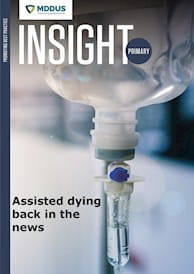BACKGROUND
A practice manager (PM) in England contacts MDDUS for advice on a formal patient complaint. The case involves a DVLA medical form for an appliance delivery driver, Mr N.
A GP at the practice mistakenly ticked a box on the form indicating that Mr N lacked ‘insight and/or judgement to a degree that would make driving dangerous’. This resulted in Mr N having his driving licence revoked.
Mr N contacted the practice immediately and the GP acknowledged the mistake and emailed the DVLA to inform them that the box had been ticked in error. A copy of this email was also sent to Mr N’s employer, with Mr N’s consent.
Two months later Mr N was still awaiting confirmation from the DVLA that his licence was now reinstated – and this despite two chasing emails having been sent by the practice.
In his letter of complaint Mr N claims that he has been given some limited clerical duties at his firm and is dependent on his wife to drive him to and from work. This has caused significant stress and depression due to lost earnings and he is seeking financial compensation.
An MDDUS medical practice adviser reviews a draft letter of response from the practice and suggests amendments.
ANALYSIS/OUTCOME
A revised draft response is prepared by the practice manager incorporating the adviser's comments. The PM first apologises for what happened to Mr N and includes the GP’s personal acknowledgement and regret over the error. The letter further states that the practice welcomes feedback on the care it provides – and that it takes patient concerns seriously as important opportunities to learn and improve.
The PM makes clear how the incident was investigated and restates the chronology of the incident and her understanding of Mr N’s concerns – in particular acknowledging the personal impact of the long delay in resolving the issue with the DVLA.
The letter provides the details of the GP's management as set out in his comments and the patient records. The PM further states that the case has been the subject of a “significant event” discussion at a recent practice meeting.
The practice team have agreed the need to take extra care when filling out forms such as those for the DVLA, even when the practice is busy and such tasks are undertaken at the end of the day. The case illustrates how even simple errors can have a major impact.
The PM offers to meet with Mr N face to face to discuss the matter further and reminds him that should he remain unsatisfied with this response there is the option of raising the matter with the health ombudsman.
In regard to compensation the PM informs Mr N that this is not within the remit of the NHS complaints process and would have to be pursued via a legal claim.
While claims relating to NHS work in general practice in England are covered by NHS Resolution, this was non-contractual work for which a patient was charged a fee by the practice. Accordingly it would fall within the scope of the individual GP's indemnity cover for his private work on NHS patients. As this is provided by MDDUS, the PM is advised to keep in touch in the event that a claim for compensation does follow.
KEY POINTS
- Ensure medical forms are completed with care and diligence, mindful of potential impacts.
- An open and honest response to a patient complaint can often prevent it escalating into a claim or regulatory matter.
- Outline a summary of the complainant’s concerns – this can be particularly helpful if the complaint is complicated or multi-faceted.
- Describe how the complaint has been investigated.
- It can be helpful to provide a chronological account of care. Should you identify potential learning points as a result of your investigation, you should include these and explain any actions to address them.
- Offer of a face-to-face meeting.
This page was correct at the time of publication. Any guidance is intended as general guidance for members only. If you are a member and need specific advice relating to your own circumstances, please contact one of our advisers.
Read more from this issue of Insight Primary

Save this article
Save this article to a list of favourite articles which members can access in their account.
Save to library

